|
Laser rangefinders have become very popular
among hunters and shooters over the past several years. During
that time, there have been many brands to hit the market. While
you can always find a cheaper version of just about anything, a
good quality rangefinder costs as much as, or more than, a
quality rifle. I have used rangefinders for several years. At
long range, like in the 300 to 500 yard distances, being off on
range estimation by even a few yards means the difference
between a hit and a miss, or even worse, it could mean that a
wounded animal would be lost. Therefore, if the distance exceeds
one hundred yards, I always use a rangefinder. Even at shorter
distances, I want to know the exact range so that I can place
the bullet precisely where I want it to go. Last year on a bear
hunt, I was in a blind with my guide, Lori Anderson, and I was
using my .50 Beowulf AR-15. We were
hunting in the thick woods watching a heavily-used trail, and
knowing the exact distance made it much easier to make the shot,
as in that thick brush, a badly hit bear would be hard to find.
The distance was exactly sixty-four yards, and even at that
relatively close range, having that knowledge helped my
confidence, and my ability. At the other end of the spectrum,
hitting small targets at long distance, as in prairie dog
shooting, knowing the exact distance makes all the difference,
even when shooting a fast-stepping cartridge like one of the
twenty-two caliber centerfires. A good rangefinder can tell the
shooter just how far away the target really is. Most shooters
and hunters are poor judges of distance. An accurate rangefinder
can tell you exactly how far away the target is, and armed with
that information, hitting is much easier.
As mentioned above, a good quality
rangefinder is expensive. A more accurate statement would be
that up until now, a good quality rangefinder was expensive.
Leupold has just introduced their RX-1000 line of rangefinders,
and in doing so, they have raised the quality while lowering the
price. Most rangefinders, while doing a pretty good job of range
estimation, do not have high quality optics, With the RX-1000,
Leupold has taken what they know about high quality optics, and
put it into their rangefinders. Looking through the RX-1000, it
is readily apparent that you are looking through quality glass.
The image is more like looking through a good riflescope than
looking through a piece of waxed paper, like on some competitive
rangefinders. This RX-1000 can double as a monocular. It has six
power magnification, and the image is very clear, due to
Leupold’s use of multi-coated lenses, as they use on their
binoculars and riflescopes. The RX-1000 also has what is a great
improvement over competitive rangefinders, and that is a bright
red OLED display. Most rangefinders use a black LED display that
is very hard to see at dawn and dusk. The OLED red display on
the RX-1000 has adjustable intensity, so that it can be bright
enough to see easily in bright light, but is not blinding in low
light. The RX-1000 is offered in three variations at this time.
The basic model has line-of-sight range finding, and the two TBR
models have Leupold’s True Ballistic Range system, which
calculates the uphill/downhill shot angle, and displays the
range already adjusted for the angle. The difference between the
two TBR models is that one is black, and the other has a Mossy
Oak Break Up camouflage pattern. The RX-1000 has but two
buttons. One is the power on/off button, and the other is the
mode button. There are three different reticle options to suit
the user and the type of ranging being done. For very small
targets, the Plus Point reticle allows for very precise ranging.
A Duplex reticle is also available, and finally, a combination
of the two is there for those who prefer that option. Changing
the reticle is very easy to do, just by cycling through the mode
and power buttons. Another option is that the RX-1000 can be
easily switched between yards and meters. It will measure out to
1000 yards, or 914.4 meters. The field of view is 320 feet at
100 yards. The RX-1000 ranges from as close as ten yards, out to
1000 yards. Under 100 yards, the reading is displayed to the
nearest half yard or meter, and to the nearest yard/meter out
past 100 yards. The ocular lens is adjustable for focus, and has
a fold-down eye cup. The RX-1000 body is made of rubber-coated
aluminum, but the weight is still only 7.8 ounces, and the whole
unit is very small. I have been using a Simmons rangefinder for
a few years, and it works well, but it is as big as a loaf of
bread, is heavy, has a dark display, and only ranges out to 600
yards. This compact Leupold is no bigger than a pack of
cigarettes, weighs almost nothing, fits easily into a shirt
pocket, has a bright display, great optics, and ranges out to
1000 yards. Anybody want a good deal on a used Simmons
rangefinder?
Ranging with the RX-1000 could not be
simpler. Look through the lens, and press the power button to
turn the unit on. Pressing the power button gives an almost
instant reading. Holding down the power button while scanning
gives continuous ranges to each object as you scan past. I like
that feature.
Now for the good part. This RX-1000 is so new
that it is not on the Leupold website as I type this. I called
to find out the suggested retail price, and was pleasantly
surprised to find that it is only $349 US on the standard model,
and just $50 more for the TBR. Add another twenty bucks for the
Mossy Oak camo model. The RX-1000 comes with a handy nylon belt
case, a CR2 lithium battery, and it also has a USB port for
future upgrades, as they become available. The RX-1000 is the
smallest, lightest, brightest, and easiest to use rangefinder
that I have ever held in my hands. It is priced right, and I
highly recommend it.
For more information on Leupold optics, go to
www.leupold.com.
Jeff
Quinn
|
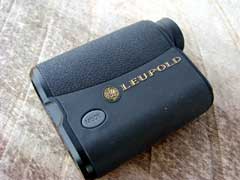
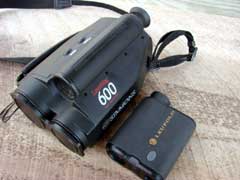
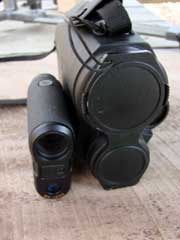
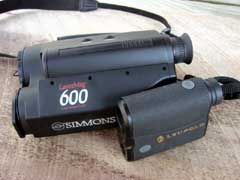
Leupold's RX-1000 compared to Jeff's Simmons 600-yard
rangefinder.
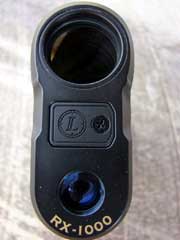
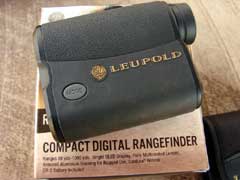
|
  
Got something to say about this article?
Want to agree (or disagree) with it? Click the following link to
go to the GUNBlast Feedback Page.
|
|
Click pictures for a larger version.
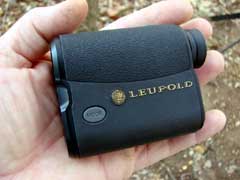
Leupold's new RX-1000 Compact Digital Laser
Rangefinder.
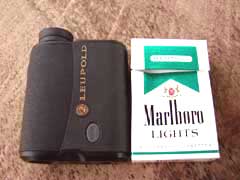
The RX-1000 is no bigger than a pack of smokes...
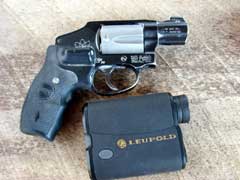
...and is much smaller and lighter than Jeff's
J-frame lightweight .38 Special.
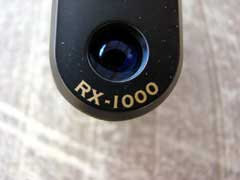
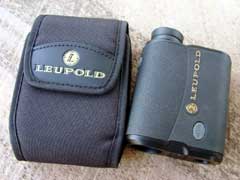
The RX-1000 comes with a soft case that attaches to
the belt for field use.
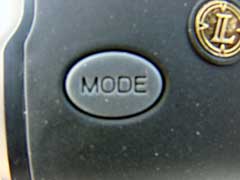
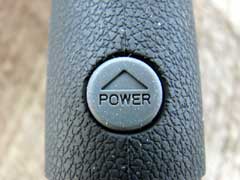
Only two buttons are needed to access all modes and
functions, making the RX-1000 quick and easy to use.
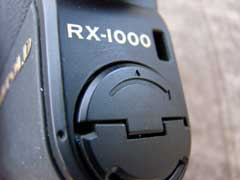
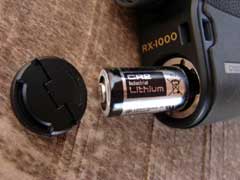
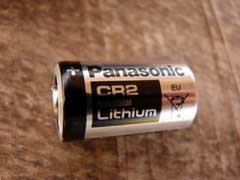
Power is provided by a single CR2 battery.
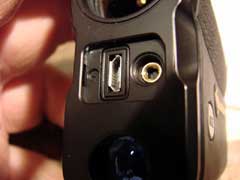
Unit is equipped with a USB port for future updates.
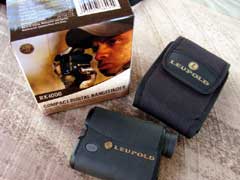
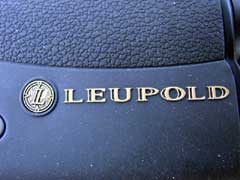
|
![]()